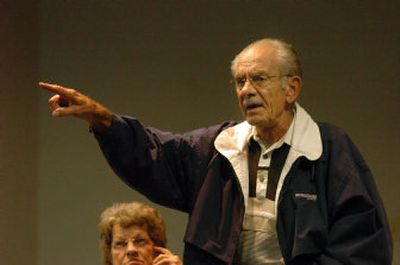Avista plan to raise rates draws few

Don and Marie Burns were dismayed Tuesday night by the empty chairs at a public meeting on Avista Utilities’ proposal to raise natural gas prices by 24 percent.
“I thought they’d have a real house full,” said Don Burns, a retired log scaler from Sandpoint. “I don’t like to drive in the dark, but my wife and I figured this was important enough that we’d chance it.”
The couple was part of a slim crowd that gathered to discuss the increase, which would boost an average residential user’s monthly gas bill from $70 to $86. The Burns’ combined gas and electric bill is already more than $100 a month during the winter. On a fixed income, paying higher heating bills mean cutbacks in other areas, such as groceries or heart medication, the couple said.
“I know there’s lots of people in the same position we are in,” Don Burns told members of the Idaho Public Utilities Commission.
Tuesday’s meeting at North Idaho College in Coeur d’Alene gave residents a chance to sound off on the proposed rate increase. Avista is asking the Idaho Public Utilities Commission for permission to increase natural gas prices starting Nov. 1. The company is also proposing a 24 percent rate hike for its Washington customers.
Idaho PUC employees sympathized with the Burns’ predicament Tuesday, but said there isn’t much they can do. Avista won’t profit from the proposed rate hike – the company is merely passing on higher wholesale gas prices to its customers, said Donn English, an IPUC auditor.
State law allows utilities to do that, English told the Burns. The PUC rigorously audits Avista, reviewing how it sets its prices. The audits also ensure that expenses like advertising and other Avista promotions are paid for by the company’s shareholders, and not by ratepayers, English said.
Over the past year, the cost of natural gas has risen 40 percent. Since Avista buys half of its natural gas supplies ahead of time in an effort to lock-in the best prices, the company has been able to temper some of the increase, company officials said.
However, the recent proposed hike doesn’t yet account for the impacts of Hurricanes Katrina and Rita, said Harry Hall, an IPUC staff engineer. The hurricanes knocked out 25 percent of the nation’s natural gas production, and it isn’t clear when it will resume, he said. Next year’s heating bills will probably reflect the storm’s impacts, he said.
Social service agencies are bracing for a deluge of requests for help with higher heating bills.
At Community Action Partnership in Coeur d’Alene, 80 percent of the callers are asking about getting help with their heating bills, employee Erin Wilkinson said in a phone interview earlier in the day. The agency will start booking appointments in early November. “I think that we’ll see a lot of first-time people in,” Wilkinson said.
Community Action Partnership will also give away $350,000 for low-income weatherization this year. The money comes from Avista, which has tripled the amount of funding from past years.
Robin Waller, spokeswoman for Spokane Neighborhood Action Programs, said her agency also expects to see increased demand for its low-income energy assistance program, which begins at the end of the month. In addition to higher heating bills at home, energy price hikes also “increase prices on everything” as retailers, factories and service providers pass along their higher costs, she said.
Peoples’ “budgets will be stretched, therefore they have to rely on our program,” Waller said.
Last winter, SNAP provided $4.5 million in assistance to more than 10,000 households.
In other parts of the country, gas customers could see even bigger spikes in their bills. Nationwide, the natural gas industry is projecting that costs will rise an average of 50 percent. Some homeowners in the Midwest, where natural gas is used in four out of every five homes, could pay as much as $1,600 to heat their homes this winter if temperatures turn colder than normal, according to the American Gas Association and consumer advocates.
Burns’ goal is to make it through the winter without seeking assistance.
“I’ve never taken charity from anyone, and I’m not going to start now,” he said. But the winter promises lean times. “I’ve got my heart pills, and my jackknife in my pocket. There’s not a dime in here,” he said.
The Associated Press and Business Editor Addy Hatch contributed to this report.